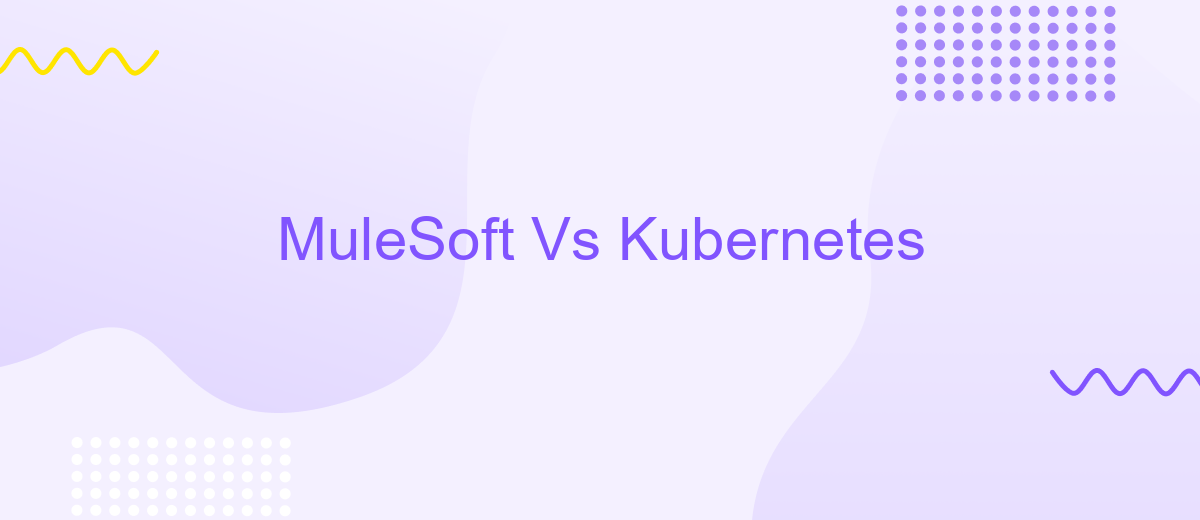MuleSoft Vs Kubernetes
In the rapidly evolving landscape of enterprise technology, MuleSoft and Kubernetes stand out as pivotal tools for modern businesses. While MuleSoft excels in API management and integration, Kubernetes offers robust container orchestration. This article delves into the core functionalities, advantages, and use cases of each, helping you determine which solution best aligns with your organizational needs.
Introduction
In the rapidly evolving landscape of modern technology, businesses are continually seeking efficient ways to manage and integrate their applications and services. Two prominent solutions that have garnered significant attention are MuleSoft and Kubernetes. Both platforms offer unique capabilities that cater to different aspects of application management and integration, making it crucial for organizations to understand their distinct features and benefits.
- MuleSoft: A leading integration platform that enables seamless connectivity between diverse applications, data sources, and APIs.
- Kubernetes: An open-source container orchestration platform designed to automate the deployment, scaling, and management of containerized applications.
- ApiX-Drive: A service that simplifies the integration process by allowing users to connect various applications and automate workflows without requiring extensive technical knowledge.
Understanding the strengths and use cases of MuleSoft and Kubernetes can help businesses make informed decisions on which platform to adopt for their specific needs. Whether it's achieving seamless integration with MuleSoft or managing containerized applications with Kubernetes, each tool offers valuable solutions to streamline operations and enhance productivity.
MuleSoft

MuleSoft is a leading platform for building application networks that connect enterprise apps, data, and devices. It provides a comprehensive suite of tools for designing, building, and managing APIs, enabling seamless integration across various systems. With MuleSoft, organizations can streamline their operations, improve data flow, and enhance customer experiences by connecting disparate systems into a unified ecosystem. The platform supports a wide range of protocols and technologies, making it versatile and adaptable to different integration needs.
One of MuleSoft's standout features is its ability to simplify complex integrations through a user-friendly interface and pre-built connectors. This allows businesses to quickly set up integrations without extensive coding knowledge. Additionally, services like ApiX-Drive can further enhance MuleSoft's capabilities by providing automated data transfer between various applications and services. ApiX-Drive offers an intuitive platform for setting up integrations, making it easier for businesses to synchronize data and automate workflows. Together, MuleSoft and ApiX-Drive empower organizations to achieve efficient and scalable integration solutions.
Kubernetes

Kubernetes, an open-source container orchestration platform, is designed to automate the deployment, scaling, and management of containerized applications. It provides a robust framework for running distributed systems resiliently, enabling developers to focus on building applications rather than managing infrastructure. Kubernetes is highly extensible and supports a wide range of workloads, making it a popular choice for modern cloud-native applications.
- Automatic bin packing: Efficiently places containers based on resource requirements and constraints.
- Self-healing: Automatically restarts failed containers, replaces and reschedules them when nodes die.
- Horizontal scaling: Scales applications up and down automatically based on demand.
- Service discovery and load balancing: Automatically exposes containers using DNS names or IP addresses.
- Automated rollouts and rollbacks: Gracefully rolls out changes and rolls back if something goes wrong.
Integrating Kubernetes with other services like ApiX-Drive can further streamline the automation of workflows and data integration. ApiX-Drive offers a no-code platform for connecting various applications and services, enhancing the capabilities of Kubernetes by simplifying the integration process. This combination allows businesses to achieve seamless and efficient operations, reducing the time and effort required to manage complex systems.
Comparison

MuleSoft and Kubernetes serve different purposes in the tech ecosystem. MuleSoft is an integration platform that helps connect applications, data, and devices, enabling seamless data flow and process automation. On the other hand, Kubernetes is an open-source container orchestration platform designed to automate the deployment, scaling, and management of containerized applications.
While MuleSoft focuses on integrating various systems and APIs, Kubernetes excels at managing containerized workloads and services. Both tools are essential for modern enterprise architecture but address different challenges.
- Purpose: MuleSoft for integration, Kubernetes for container orchestration.
- Core Functionality: MuleSoft connects APIs and data sources, Kubernetes manages containers.
- Use Case: MuleSoft for API management and data integration, Kubernetes for scaling and managing applications.
- Complementary Tools: MuleSoft can be complemented with ApiX-Drive for enhanced integration capabilities, while Kubernetes can work with tools like Helm for package management.
In summary, MuleSoft and Kubernetes are both critical in their respective domains. While MuleSoft streamlines API and data integration, Kubernetes ensures robust container management. Depending on your needs, you might use one or both to achieve a comprehensive and efficient IT infrastructure.
Conclusion
In conclusion, both MuleSoft and Kubernetes offer robust solutions for different aspects of modern application development and integration. MuleSoft excels in providing a comprehensive integration platform that simplifies the connection of disparate systems, making it an ideal choice for businesses looking to streamline their API management and integration processes. On the other hand, Kubernetes shines in orchestrating containerized applications, ensuring scalability, reliability, and efficient resource management in cloud-native environments.
When deciding between MuleSoft and Kubernetes, it is essential to consider the specific needs of your organization. If your primary focus is on integrating various applications and services seamlessly, MuleSoft's capabilities, complemented by tools like ApiX-Drive, can significantly enhance your integration strategies. Conversely, if your goal is to manage and scale containerized applications efficiently, Kubernetes will provide the necessary infrastructure and orchestration capabilities. Ultimately, the choice depends on your unique requirements and the technological landscape of your enterprise.
- Automate the work of an online store or landing
- Empower through integration
- Don't spend money on programmers and integrators
- Save time by automating routine tasks
FAQ
What is the primary difference between MuleSoft and Kubernetes?
Can MuleSoft and Kubernetes be used together?
Which platform is better for API management?
Is Kubernetes necessary for running MuleSoft applications?
How can I automate integration processes without deep technical knowledge?
Time is the most valuable resource for business today. Almost half of it is wasted on routine tasks. Your employees are constantly forced to perform monotonous tasks that are difficult to classify as important and specialized. You can leave everything as it is by hiring additional employees, or you can automate most of the business processes using the ApiX-Drive online connector to get rid of unnecessary time and money expenses once and for all. The choice is yours!


